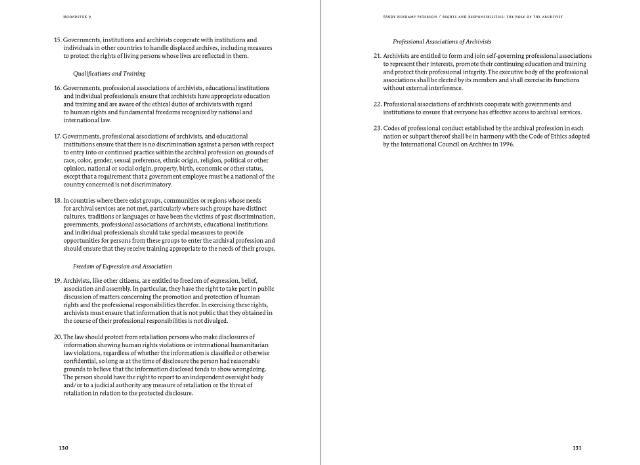15. Governments, institutions and archivists cooperate with institutions and
individuals in other countries to handle displaced archives, including measures
to protect the rights of living persons whose lives are reflected in them.
Qualifications and Training
16. Governments, professional associations of archivists, educational institutions
and individual professionals ensure that archivists have appropriate education
and training and are aware of the ethical duties of archivists with regard
to human rights and fundamental freedoms recognized by national and
international law.
17. Governments, professional associations of archivists, and educational
institutions ensure that there is no discrimination against a person with respect
to entry into or continued practice within the archival profession on grounds of
race, color, gender, sexual preference, ethnic origin, religion, political or other
opinion, national or social origin, property, birth, economic or other status,
except that a requirement that a government employee must be a national of the
country concerned is not discriminatory.
18. In countries where there exist groups, communities or regions whose needs
for archival services are not met, particularly where such groups have distinct
cultures, traditions or languages or have been the victims of past discrimination,
governments, professional associations of archivists, educational institutions
and individual professionals should take special measures to provide
opportunities for persons from these groups to enter the archival profession and
should ensure that they receive training appropriate to the needs of their groups.
Freedom of Expression and Association
19. Archivists, like other citizens, are entitled to freedom of expression, belief,
association and assembly. In particular, they have the right to take part in public
discussion of matters concerning the promotion and protection of human
rights and the professional responsibilities therefor. In exercising these rights,
archivists must ensure that information that is not public that they obtained in
the course of their professional responsibilities is not divulged.
20. The law should protect from retaliation persons who make disclosures of
information showing human rights violations or international humanitarian
law violations, regardless of whether the information is classified or otherwise
confidential, so long as at the time of disclosure the person had reasonable
grounds to believe that the information disclosed tends to show wrongdoing.
The person should have the right to report to an independent oversight body
and/or to a judicial authority any measure of retaliation or the threat of
retaliation in relation to the protected disclosure.
Professional Associations of Archivists
21. Archivists are entitled to form and join self-governing professional associations
to represent their interests, promote their continuing education and training
and protect their professional integrity. The executive body of the professional
associations shall be elected by its members and shall exercise its functions
without external interference.
22. Professional associations of archivists cooperate with governments and
institutions to ensure that everyone has effective access to archival services.
23. Codes of professional conduct established by the archival profession in each
nation or subpart thereof shall be in harmony with the Code of Ethics adopted
by the International Council on Archives in 1996.
HOOFDSTUK 9
130
TRUDY HUSKAMP PETERSON RIGHTS AND RESPONSIBILITIES: THE ROLE OF THE ARCHIVIST
131

